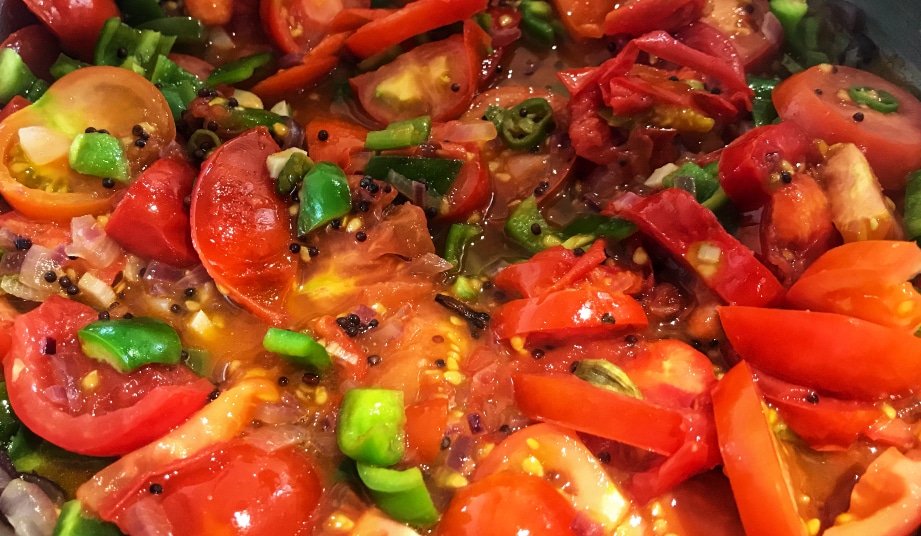For me, sweet and sour tomatoes epitomise the summer of my childhood. We always had an abundance of home-grown tomatoes. The whole garden smelled of the incomparable aroma of the tomato plant.
How did this recipe come about?
I love tomatoes because they bring back so many wonderful memories and the sweet and sour flavour flatters my VATA constitution. As I only eat tomatoes in season and from my own garden, I can hardly wait until my home-grown red favourites are ripe. In my overzealousness, I once again grew too many plants and the yield was so plentiful that I came up with a tomato sauce for lunch. I found some ripe jalapenos and peppers next to my tomato plants and the new dish was born in my head. I immediately set about making it in my cookery studio.
What does this sauce go with?
This sauce is very versatile. In larger quantities, it can be served with pasta, nettle dumplings or rice, and is also flavourful with fish and meat. In small quantities and slightly thickened, it is also suitable as a dip for barbecues, fondue or raclette.
Garlic substitute Asafoetida!
I'm a little sensitive to the use of garlic, but I really like the flavour, especially in a tomato dish. Asafoetida is therefore an excellent substitute for garlic. Asafoetida is the gum resin from the root of the ferula plant. In Indian cuisine, asafoetida is also known as hing. Asafoetida is dried and usually ground with fenugreek as a carrier substance for use in the kitchen. The spice has a strong, pungent, slightly sulphurous odour and is therefore similar to the taste and smell of garlic. Asafoetida helps with digestion, has a deflating effect and makes tomatoes more digestible. Use asafoetida very carefully, as the fenugreek in the spice powder is very bitter and the dish can quickly become too bitter as a result (my own "bitter" experience!).
Ayurveda, tomatoes and the seasons
To maintain health and balance, it is advisable to eat seasonally. Tomatoes in winter are not good for our health and should be avoided outside the summer season. The tomato is a nightshade plant and should not be consumed in excess according to Ayurvedic principles. Tomatoes contain a lot of histamine and can lead to intolerances if eaten in excess. When I started to study Ayurveda, the principles and the composition and effects of food, I suddenly realised a lot of things. I had been eating very carelessly. It was like an eye-opener and I realised why my health wasn't really good. Tomatoes are a good example. I didn't realise how often I cooked something with tomatoes. Pasta with tomato sauce, tomato puree in soup etc. When I started to reduce my tomato consumption, I felt better very quickly. Now, when I enjoy tomatoes in summer, I have no problems.
I mainly eat seasonally, i.e. I don't buy blueberries, strawberries etc. in winter and am all the happier when the time comes to either pick these little fruits myself in the garden, receive them as gifts from dear neighbours or pick them up at the weekly market. The philosophy of Ayurveda also includes respecting and appreciating food and making a conscious choice. Nature gives us what we need most at the time of year.



0 Comments